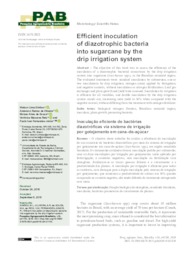Efficient inoculation of diazotrophic bacteria into sugarcane by the drip irrigation system.
Efficient inoculation of diazotrophic bacteria into sugarcane by the drip irrigation system.
Author(s): SIMOES, W. L.; OLIVEIRA, A. R. de; SOUZA, M. A. de; REIS, V. M.; FERNANDES JUNIOR, P. I.
Summary: The objective of this work was to assess the efficiency of the inoculation of a diazotrophic bacterial consortium by the drip irrigation system into sugarcane (Saccharum spp.), in the Brazilian semiarid region. The evaluated treatments were: standard inoculation by submersion; one or two inoculations by drip irrigation; nitrogen (urea) applied by fertigation; and negative controls, without inoculation or nitrogen fertilization. Leaf gas exchanges and plant growth and yield were assessed. Inoculation by irrigation is efficient for all variables, and double inoculation by the drip irrigation system stands out, increasing stem yield in 16% when compared with the negative control, without differing from the treatment with nitrogen fertilizer.
Publication year: 2019
Types of publication: Journal article
Unit: Embrapa Semi-arid Region
Observation
Some of Embrapa's publications are published as ePub files. To read them, use or download one of the following free software options to your computer or mobile device. Android: Google Play Books; IOS: iBooks; Windows and Linux: Calibre.
Access other publications
Access the Agricultural Research Database (BDPA) to consult Embrapa's full library collection and records.
Visit Embrapa Bookstore to purchase books and other publications sold by Embrapa.

